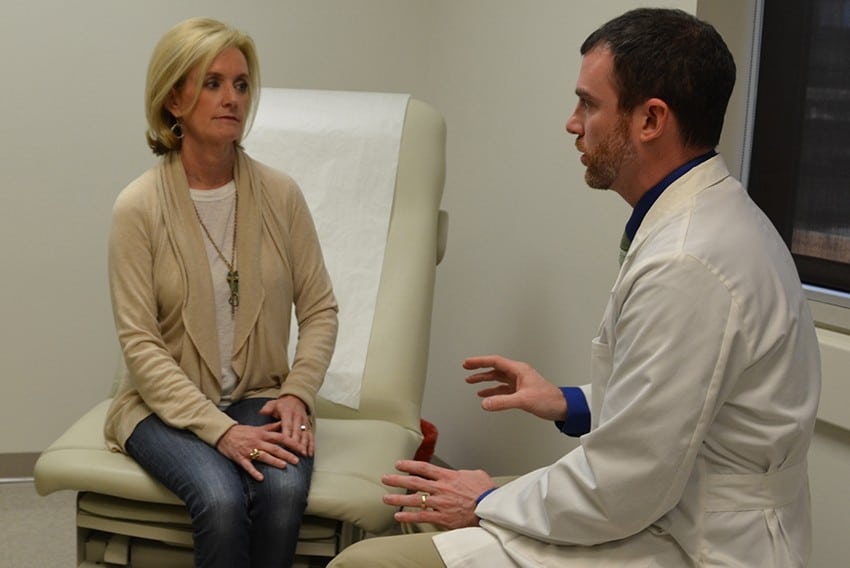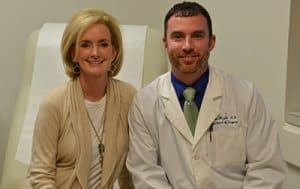Little Rock Mom Thankful for Beating Colon Cancer
| Jan. 29, 2016 | Alice Rogers knew something was wrong. What started with abdominal cramps in March 2015 had progressed to severe pain by July.
“It hurt every time I ate, sometimes making me double over,” she said, adding that she also was passing pencil-thin stools. “I knew something was wrong, but I just didn’t know what.”
Having recently turned 50, Rogers knew it was recommended for her to have a colonoscopy to detect changes or abnormalities in her colon.
The American Cancer Society recommends most men and women start undergoing colonoscopies at age 50. Those at high risk for colon cancer or experiencing symptoms such as rectal bleeding, anemia or a change in bowel habits may be advised by their doctor to receive the test earlier.
Rogers’ colonoscopy came at just the right time, revealing colon cancer. “When you hear the word cancer, it’s frightening. I have two young children, and my emotions went from an initial panic to a calm realization that we were going to figure this out,” she said.
A friend who had also been treated for colon cancer recommended Rogers make an appointment with her doctor, Jason Mizell, M.D., at the UAMS Winthrop P. Rockefeller Cancer Institute. “My friend said Dr. Mizell was amazing, and she was right. He immediately put me at ease,” she said.
Because Rogers’ cancer was caught at an early stage, she underwent surgery to remove a section of her colon but did not require chemotherapy or radiation therapy.
“When we find cancer early, we can provide more effective treatments and less complex operations or invasive procedures,” said Mizell, associate professor of surgery in the Division of Colorectal Surgery in the UAMS College of Medicine.
Colonoscopies are key not only to finding colon cancer in its early stages, but also to preventing its development through the removal of pre-cancerous polyps. “It’s really an ideal test that’s both low risk and very effective,” Mizell said.
Because colon cancer can be linked to a genetic condition known as Lynch Syndrome, specimens from all UAMS patients treated for the disease are routinely tested. Those who test positive for Lynch Syndrome have an increased risk for several types of cancer, including stomach, liver, gallbladder, uterine, ovarian and others.
Rogers’ preliminary results showed a tendency toward the syndrome, so she chose to have a hysterectomy at the same time as her colon surgery to prevent the possibility of uterine or ovarian cancer in the future. That surgery was done by obstetrician/gynecologist Nirvana Manning, M.D., associate professor in the Department of Obstetrics and Gynecology in the UAMS College of Medicine.
“A true benefit of coming to an academic medical center like UAMS is that we provide total comprehensive care in one location at one time,” Mizell said. “Mrs. Rogers was able to have two surgeries on the same day, requiring only one incision and one 3-day hospital stay. If she had gone elsewhere, that may not have been an option,” Mizell said.
If the final results of Rogers’ genetic tests are positive for Lynch Syndrome, she can opt to have genetic testing for her children as well, as they also could be carriers of the gene and susceptible to certain cancers.
Three months out from her surgery, Rogers is happy to be back to her normal routine and thankful to her health care team. “I had the most amazing experience at UAMS. Both of my doctors were wonderful. They went above and beyond to take care of me, and I can’t thank them enough,” she said.

